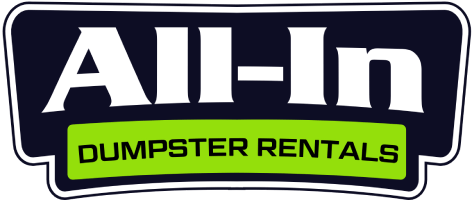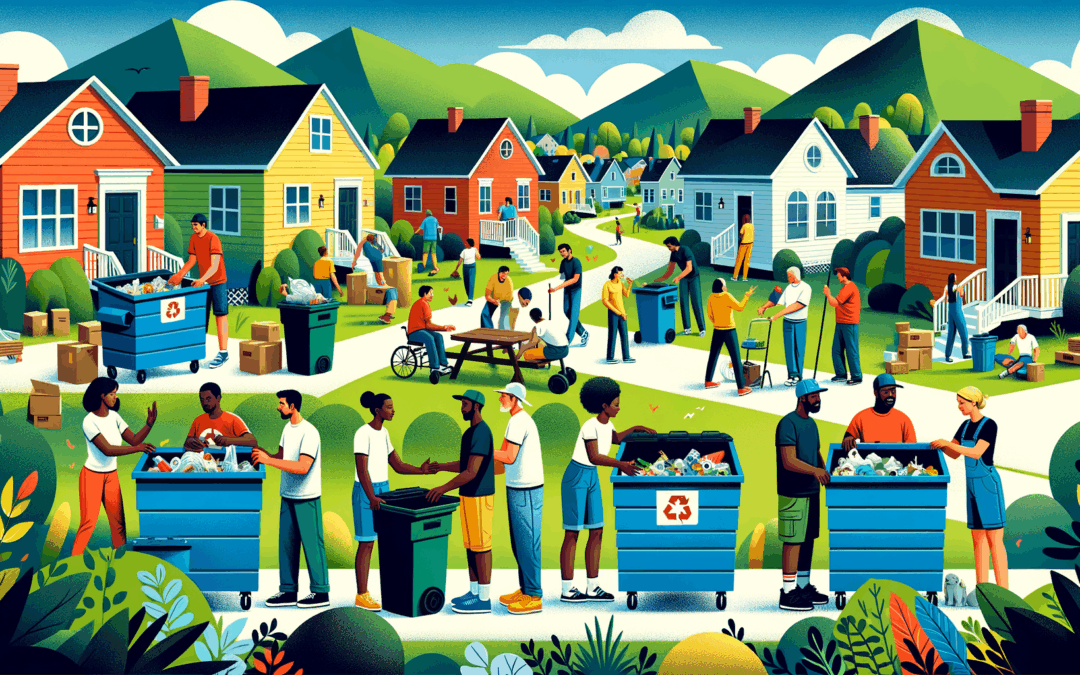Living in the beautiful mountain landscape of Asheville comes with unique responsibilities when it comes to property maintenance and community cleanliness. With our lush natural surroundings and tight-knit neighborhoods, community cleanup efforts often make more sense when neighbors join forces. But how can you effectively coordinate and share the costs of dumpster rentals to make these neighborhood projects affordable and efficient?
Here in Western North Carolina, our communities have a special character. From the winding streets of Montford to the closely situated homes in West Asheville, many of us share more than just property lines—we share a commitment to keeping our mountain home beautiful. Having coordinated hundreds of neighborhood cleanups across Buncombe, Henderson, Haywood, and Madison counties, we’ve learned that collaborative dumpster rentals can cut costs while building community bonds.
Why Consider Shared Dumpster Rentals in Asheville?
Asheville residents face specific challenges when tackling property cleanups. Our seasonal changes bring different cleanup needs—from fallen leaves in autumn to storm debris in summer. Individual yard waste, renovation projects, and general decluttering can quickly overwhelm standard trash service.
When neighbors coordinate cleanup efforts, the benefits multiply:
Cost-sharing significantly reduces the expense for each household—often cutting individual costs by 50-70% compared to solo rentals. A standard 15-yard dumpster that might cost $350-450 can drop to $70-90 per household when split between five neighbors.
Shared cleanup days create natural community-building opportunities, fostering relationships that strengthen neighborhood resilience. We’ve seen countless friendships form over shared work during cleanup days in communities across Asheville.
Group efforts often lead to more thorough cleanup results as neighbors help each other with larger items or difficult areas. This is particularly valuable in our mountainous terrain where managing heavy debris on slopes can be challenging.
How to Organize a Neighborhood Dumpster Share
Successful shared dumpster projects require thoughtful planning. Here’s how to coordinate effectively with your Asheville neighbors:
Start with Clear Communication
Gauge interest by speaking with immediate neighbors or posting in neighborhood groups. Nextdoor and local Facebook groups for areas like East Asheville, Weaverville, or Arden often have active community discussions where you can float the idea.
Be upfront about the potential costs and commitment involved. Transparency builds trust from the beginning, which is essential for successful collaboration.
Consider creating a simple sign-up sheet that outlines expectations, timing, and estimated costs per household based on participation levels. This helps neighbors make informed decisions about joining the effort.
Determine the Right Size and Timing
Assess the collective cleanup needs to select an appropriate dumpster size. For most neighborhood cleanups in Asheville, a 13-yard or 15-yard dumpster offers sufficient capacity without overwhelming available space.
Schedule the rental during a weekend when most participants can be present and active. In Asheville, spring (April-May) and fall (September-October) typically offer ideal weather conditions for outdoor cleanup work.
Consider local events and tourism patterns when planning. Avoiding peak visitor weekends can make parking and maneuvering easier in neighborhoods close to downtown or popular attractions.
Establish Fair Cost-Sharing Guidelines
The simplest approach is equal cost division among participating households, but consider adjustments based on usage needs. Some neighbors might have significantly more debris than others.
Collect contributions before the dumpster arrives to ensure financial commitment. Having one trusted neighbor handle collection and payment simplifies the process.
Factor in potential overweight charges in your budget planning. Mountain homes often generate heavier debris like rocks and soil that can quickly exceed weight limits.
Set Clear Usage Rules
Create and distribute a schedule for dumpster use to prevent conflicts. This is particularly important in neighborhoods with limited street access or tight driveways.
Establish guidelines about acceptable materials based on rental company restrictions. Make sure all participants understand what can and cannot go in the dumpster.
Designate a “dumpster monitor” who ensures proper loading and prevents prohibited items from being added. This person can also communicate with the rental company if needed.
Navigating Common Challenges in Neighborhood Dumpster Sharing
Even with careful planning, shared cleanup projects can face obstacles. Here’s how to address them:
Managing Unequal Usage
If significant disparities in usage emerge, consider adjusting the cost distribution accordingly. Flexibility maintains goodwill among neighbors.
For projects where usage will clearly vary, establish tiered pricing in advance based on estimated volume. This works well for neighborhoods with mixed housing types, like those in North Asheville with both small bungalows and larger homes.
Consider organizing separate rental days for very large cleanouts to keep the shared dumpster available for general neighborhood use.
Preventing Unauthorized Usage
Place the dumpster in a visible, semi-private location when possible. Asheville’s hilly terrain often provides natural placement options that limit access from passing traffic.
Consider covering the dumpster overnight with a tarp to discourage random dumping. This is particularly important in more urban areas or on streets with higher traffic.
Post clear signage indicating the dumpster is for private use by specific households. Some neighborhood groups even create fun, personalized signs that build community pride while deterring outside use.
Handling Overflow Issues
Plan for efficient loading by breaking down large items and filling gaps. Our mountain cleanup projects often include bulky brush and yard waste that requires careful loading.
If overflow seems likely, contact the rental company about a possible early pickup and replacement. Many local Asheville companies are accommodating when given advance notice.
Consider having a contingency plan for excess materials, such as identifying items that could be held for another cleanup day or taken to the Buncombe County Transfer Station individually.
Building Community Through Shared Cleanup Projects
Beyond the practical benefits, neighborhood dumpster sharing creates opportunities for deeper community connections:
Turn Cleanup into a Community Event
Organize a neighborhood cookout or potluck following the cleanup. Asheville’s food-loving culture makes this a natural fit, and local breweries often donate beverages for community events.
Create a skill-sharing component where neighbors help each other with specialized tasks. From chainsaw work to brush clearing on steep lots, different neighbors bring valuable skills to the table.
Document the before-and-after transformation with photos to celebrate the collective achievement. Neighborhood social media groups love seeing these visible improvements.
Expand Beyond One-Time Events
Use successful dumpster shares to build momentum for regular seasonal cleanups. Many Asheville neighborhoods have established quarterly or biannual traditions.
Consider forming a neighborhood beautification committee to coordinate ongoing efforts. This works particularly well in established neighborhoods like Kenilworth or Malvern Hills.
Look for opportunities to incorporate environmental stewardship into cleanup efforts, such as separating recyclables or composting appropriate materials. Asheville’s strong environmental values make this a popular addition.
Special Considerations for Asheville Neighborhoods
Our unique mountain setting creates specific challenges and opportunities for neighborhood cleanups:
Navigating Mountain Terrain
Be strategic about dumpster placement considering our hilly topography. Even a slight incline can make loading heavy items challenging.
Communicate clearly with the rental company about access limitations on narrow mountain roads. All-In Dumpster Rentals specializes in navigating Asheville’s challenging streets and steep driveways.
Organize a “heavy item team” to help neighbors with difficult-to-move objects, especially in areas with stairs or steep paths to the street.
Addressing Seasonal Considerations
Time community cleanups strategically around mountain seasons. Spring cleanups help prepare for summer growth, while fall efforts manage leaf accumulation before winter.
Be prepared for Asheville’s sudden weather changes by having tarps available to cover the dumpster and materials during our frequent afternoon showers.
Consider wildfire prevention in your cleanup plans, especially in wildland-urban interface areas like those near the Blue Ridge Parkway. Clearing brush and yard debris is particularly valuable for community safety.
Legal and Practical Considerations
Before organizing a shared dumpster rental, address these important details:
Permissions and Regulations
Check if your neighborhood has an HOA with specific regulations about dumpster placement. Some Asheville communities have restrictions that require advance approval.
Determine if city permits are needed for street placement. Different areas of Asheville and surrounding communities have varying requirements—downtown areas typically have stricter regulations than outlying neighborhoods.
Ensure the selected location doesn’t block traffic, emergency access, or utilities. This is particularly important on Asheville’s narrower streets and cul-de-sacs.
Insurance and Liability
Clarify liability coverage with the dumpster rental company. Most reputable local companies carry appropriate insurance for their equipment.
Consider having participants sign a simple acknowledgment of the shared responsibility and potential risks of the cleanup activity.
Be mindful of safety during the cleanup, particularly when handling heavy or sharp objects. Mountain cleanup projects often involve unique hazards like cutting tools for brush management.
Writing Up a Simple Agreement
Though informal arrangements work in many cases, a simple written agreement can prevent misunderstandings. Include the cost breakdown, schedule, and usage guidelines.
Specify how unforeseen costs (like overweight charges) will be handled and distributed among participants.
Include contact information for all participating households to facilitate communication throughout the process.
Success Stories from Asheville Neighborhoods
Across Western North Carolina, communities have found creative ways to make shared dumpster rentals work effectively:
In Montford, a historic neighborhood association coordinates quarterly cleanup days with rotating dumpster locations, allowing different blocks to benefit throughout the year.
West Asheville neighbors combined a community yard sale with a cleanup day, using proceeds from sold items to offset dumpster costs—a true win-win approach.
A group of homes along Town Mountain Road established an annual spring cleaning weekend that has evolved into a beloved neighborhood tradition, complete with a community potluck and music.
As the seasons change in our beautiful mountain community, neighborhood cleanups provide both practical benefits and opportunities for strengthening community bonds. By sharing resources, Asheville residents can maintain our special mountain character while building the connections that make our neighborhoods truly special places to live.
Ready to organize a shared neighborhood cleanup in your area? We’re happy to help with sizing recommendations, placement advice, and scheduling that works for group projects. Our experience serving Western North Carolina communities makes us your ideal partner in neighborhood beautification efforts.

